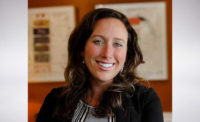Name/Title/Company: Victoria Brinemugha, senior mechanical engineer, Osborn Engineering
Age: 29
Educational Experience: Bachelor’s degree in architectural engineering, Pennsylvania State University
Professional Credentials/Accreditations: Licensed professional engineer (P.E.)
Organizational Affiliations/Achievements/Awards: ASHRAE member, National Society of Black Engineers (NSBE), and Commercial Real Estate Women (CREW).
What does your day-to-day job entail?
My day-to-day job is divided into three subcategories: assistant project management, project design, and business development. I primarily handle the technical aspect of designing a project from start to finish while also focusing on building the company's backlog for acquiring new projects and writing proposals. Typically, I assume the role of lead engineer on a project, which provides me with the opportunity to supervise younger engineers and educate them throughout each project's life cycle.
What caused you to/when did you fall in love with engineering?
I often tell people that engineering fell in love with me first. This industry found me, and I love that about my journey. I grew up in Nigeria, where I graduated as the best student in technical drawing from my secondary school (high school). I excelled in building design and science classes, but I was only aware of architecture programs. Knowing I wanted to study in America, I asked my uncle to help me apply to universities with strong architectural programs. However, when he saw the combination of my strongest classes, he applied for architectural engineering programs instead. It wasn't until I started receiving my admission letters that I realized this program was truly meant for me. It brought me immense joy. I hadn't realized I could combine my creativity within the built environment with science and engineering. While architecture made me feel limited, engineering helped me feel limitless.
What has been the most rewarding/proudest aspect of your engineering career?
I'm amazed by how far I've come in such a short time. Regardless of how many times we replicate a system design, every building remains a prototype. The ability to stay creative and open to new experiences is crucial for personal and professional growth. I take pride in having worked on a diverse range of HVAC system designs, accumulating valuable experience over the years. Among these experiences, the most rewarding project to date has been the Michigan Central Station project.
What challenges do women face in this profession? Can you give a personal example? Why aren’t there more women in engineering? How can we increase the number of women in engineering?
In my experience, one of the most significant challenges we face as women in the engineering field is the balancing act that comes with the biggest role in humanity: The ability to birth and raise a child. It's not because we are incapable of balancing both our personal and professional lives but because societal norms often limit our choices. As a result, we often find ourselves working harder to create those choices for ourselves.
For instance, I got pregnant with my first child while I was in the midst of leading the mechanical construction administration for a major historical project in Detroit. Suddenly, the 24 hours in a day felt incredibly insufficient to complete all my tasks. I struggled to maintain a work-life balance because my body was undergoing changes, while the complexity of my work and the expectations from my team remained unaltered. Many women face this battle and often opt to prioritize their families.
It's imperative that we, as an industry, become more accommodating. This includes fairer salaries and improved maternity leave policies. Every office should provide a mother's room to support breastfeeding as they return to work. Human resources departments and decision-makers can take steps to ensure proximity to established child care facilities near office locations. This way, mothers can confidently commute to the office, knowing their children are nearby and well-cared for.
Furthermore, engineering firms should strive for diversity at the top managerial levels. The value of an industry is often reflected through its people. When more women hold top roles within engineering companies, it sends a powerful message to younger women, inspiring them to believe in themselves and demonstrating that, despite the challenges, they can be overcome with the right support and opportunities.
How many years have you been active in the engineering sector? What’s changed the most in that time? What’s changed the least?
Over the past nine years, I've observed positive changes in the engineering industry, particularly in the area of diversity and compensation competitiveness. Engineering companies are now more attentive to the importance of diversity, and there has been an encouraging upward trend in compensation to attract and retain talent.
However, it's worth noting that maternity leave policies in the engineering field appear to lag behind those in other industries, such as technology. This is an area where there is still room for improvement and alignment with evolving workplace standards.
You co-founded a minority women-owned consulting engineering company, Edifel Designs. Tell us more about this endeavor.
This endeavor was curated during the pandemic when I was asked to work on a few small projects that were focused on business revitalization and neighborhood transformation in areas, such as the west and south sides of Chicago. So, I asked a few close friends to join me and take roles for each discipline, allowing us the ability to provide quality mechanical, electrical, and plumbing (MEP) design on projects that directly empower diverse neighborhoods and business owners.
You were the lead mechanical engineer on the Michigan Ford Central Station and Book Tower Redevelopment projects. Tell us about the ups and downs of these projects.
The most rewarding aspects of both projects have been the ability to apply complex mechanical design solutions to historical buildings. But, they were both very difficult to design or manage because incorporating these new technologies while maintaining significant historic portions of the building required a lot of creativity. To manage heavy requests for information (RFIs) and submittals, one had to work a lot of hours to make sure the project stayed on course and the client was satisfied.
What drives/motivates you every day?
My family. Their well-being, happiness, and future are my constant source of inspiration and determination. I strive to work hard and make the most of each day, knowing my efforts directly impact the lives of my loved ones.
What remains on your engineering bucket list — what do you aspire to do that you haven’t accomplished yet?
I would like to lead the largest projects in neighborhood vitality programs.
What’s one thing no one knows about you?
Not many people are aware that, in 2019, I took a career leave to work with underserved women in South Africa and volunteer at a sustainable design company. This experience exposed me to a facility that recycled black water into 100% clean, drinkable water.
List any mentors who’ve helped you succeed and describe precisely how they’ve shaped your success.
My original mentor will always be Rebecca Delaney. She currently holds the position of director of building infrastructure and performance at Rivian. I first met her in 2014, when she applied through the ASHRAE student program to become a mentor, and I applied to be a mentee. She has been the cornerstone of my success. Wherever I have been, she has been there with me, through thick and thin. Although we began with small things like breakfast and lunch, she also assisted me with my recommendation letter for the ASHRAE scholarship I received during my university years. As an international student, with my family living in Nigeria, having a mentor meant a lot to me. I took her guidance very seriously. I cannot overstate the importance of having a mentor — not just any mentor, but one who invests time in teaching mentees and believes in them. All I needed was for her to believe in me, and then for me to believe in myself. The rest is history.
What advice do you have for prospective female engineers considering entering the field?
Stay focused. In all honesty, what's within you is greater than the complexity of our industry. Every challenge can be overcome. Seek and you will find the right resources for every aspect of your career. Don't let your gender limit you, let it empower you.
This may sound like a cliché, but it is not.
If you’re feeling lost or without direction, consider joining engineering organizations with mentorship programs. If the challenge is maintaining work-life balance, educate yourself on setting work boundaries and consult with trusted peers and mentors to implement it. If the challenge is salary negotiation, read articles, and negotiate your salary.
Don't believe you cannot achieve the highest ranking in your career just because you are a woman.





